Love, Ghostie is the wholesome dating sim I never knew I needed
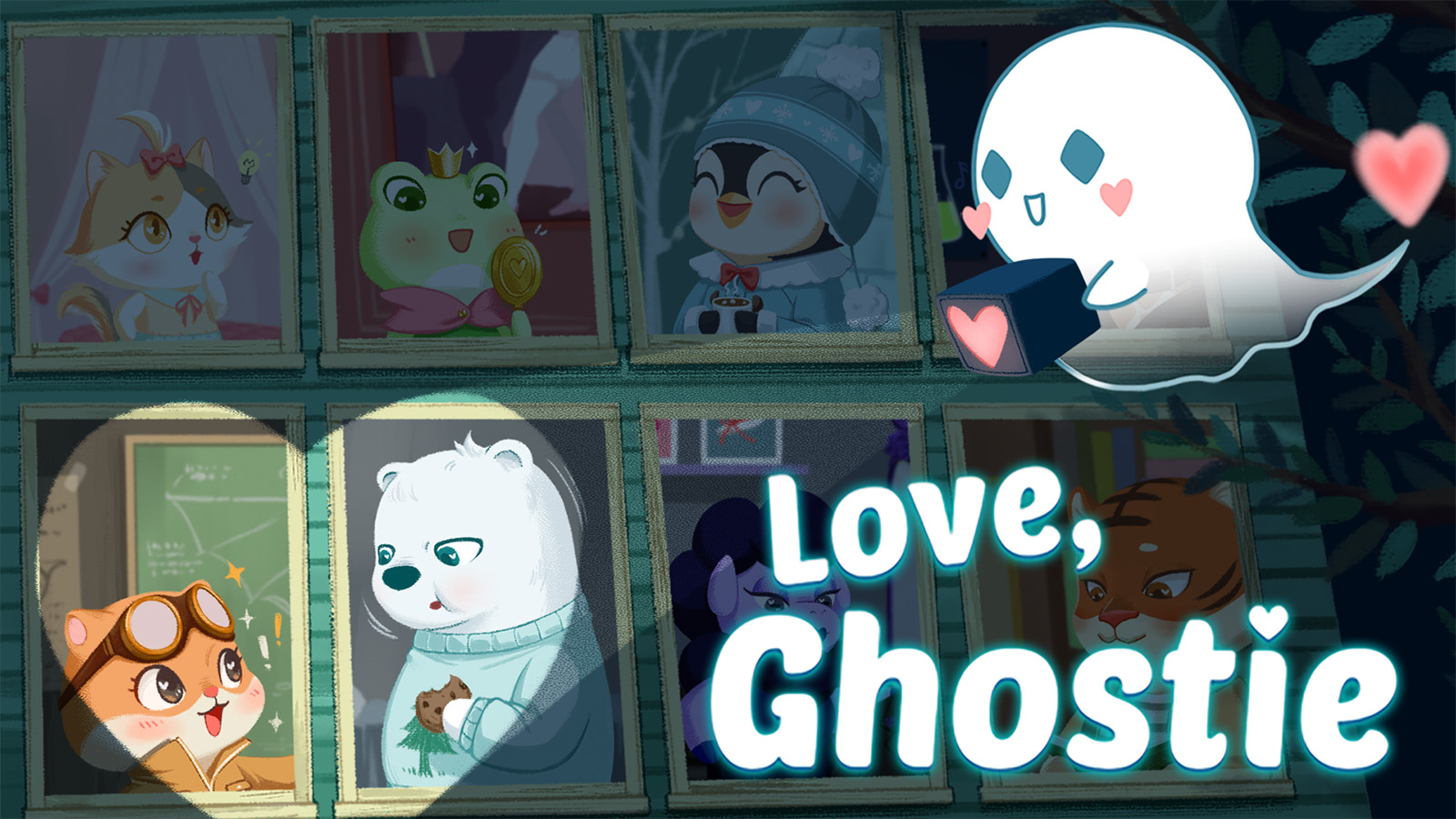
They say that romance is dead, but in Love, Ghostie romance actually is dead, and it’s a ghost. Imagine this: You (unknowingly) move to a manor haunted by ghosts, but instead of being hunted and spooked, you’re set up on dates with your adorable anthropomorphic housemates before being shipped off to start a new life as a young couple.
That’s Love, Ghostie, a matchmaking dating sim from developer Janbeh Games that, more than a year after its initial launch on Steam, is coming to Nintendo Switch consoles. Although I’m not usually one for dating sims or similar themed reality shows and movies, Love, Ghostie managed to strike a chord in me thanks to its witty writing and touching moments between relatable characters despite being set in a completely fantasy world.
You follow Ghostie, a recently deceased who is tasked with helping the new housemates of an empty (and now haunted) manor find love and spread acceptance. You’re not alone, though, as mentor Ghostina is at the manor to help, welcoming you to the afterlife while seemingly ignoring your shock over your sudden death. She’s iconic, a complete diva, and serves as your tutorial to the game’s core mechanics while a very clever ghostly social media platform named Deaddit regularly shares hints, tips, and candid commentary on the happenings within your game.
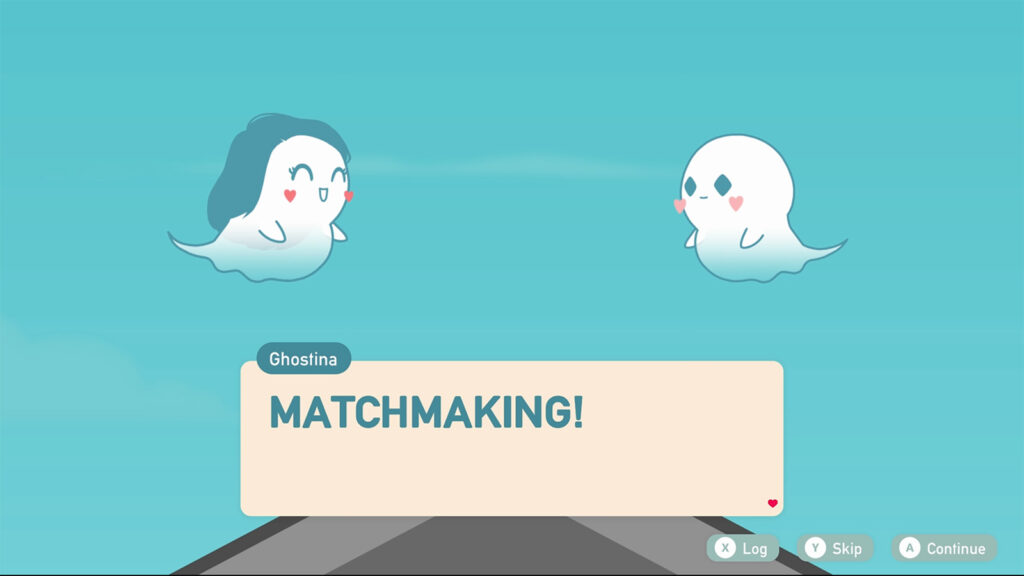
It was the witty writing that pulled me in first. Within the first minutes I was laughing out loud at Ghostina’s banter with Ghostie and laughed harder when, during the tutorial, I decided to sell a drawing of an apple on the ghostly web rather than follow Ghostina’s instructions, and soon found a thread on Deaddit exclaiming that other ghosts had done the same, each shaming each other for their (and my) poor decision.
The humour remains throughout the game, which made it a huge joy to play. You can expect more witty remarks in Deaddit on your gameplay and actions as you unknowingly set up housemates on incompatible dates to result in awkward meets, give characters gifts they dislike, or watch housemates settle their small arguments and tantrums as their relationships build.
Move over Casper, there’s a new friendly (and romantic) ghost in town.
Since this is a matchmaking game, increasing relationships between characters is the key focus. All housemates who move into the manor have zero relationships with one another, and it’s your job to pair characters who you believe will get along together by encouraging social activity on a day-by-day basis. Using a chore board, you’re given three options for social interactions each day for all current housemates; send two on a date to build their relationship, order one housemate to complete chores to build their relationship with the entire household, and order a fourth housemate to do something to improve their overall happiness in the manor.
When you start the game, you begin with only four housemates, so deciding which characters do what is easy and simple enough, but once you upgrade the manor through relationships (More on this later!), you’ll have a whopping eight housemates to juggle and limited opportunities to help build their relationship – this will force you to think more about who to pair up as you uncover each character’s traits, many of which they share with other housemates to increase the likelihood of a better pairing and success of a date.
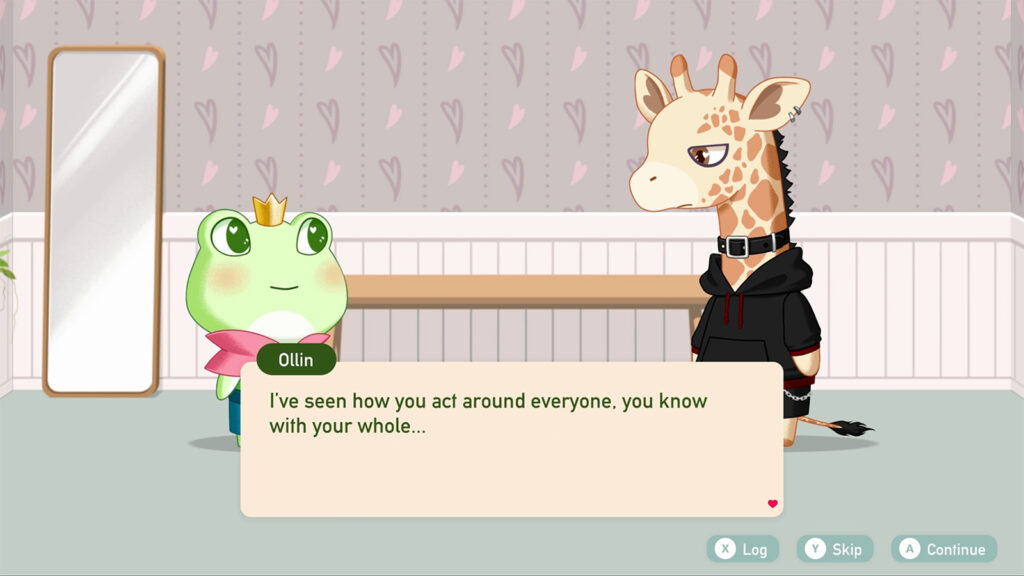
For the characters who can’t venture out on dates and fun events, you can focus on gift-giving to increase their relationship. Each day, a selection of items will appear around the manor and on a ghostly marketplace for purchase that you can gift to housemates, selecting both the recipient and the gifter. Each item is represented by the same traits characters have, so you can easily decide whether or not an item is relevant enough for someone.
All of the above is done on a day-by-day basis through limited actions. Sending characters on dates, chores, and increasing their happiness all consume one action point each, as does selling items on the ghostly market and gifting them to characters. At the beginning of the day, you can only complete four actions, which is easy enough when you have only a small household, but you can eventually upgrade this via RelationChips to eight actions per day.
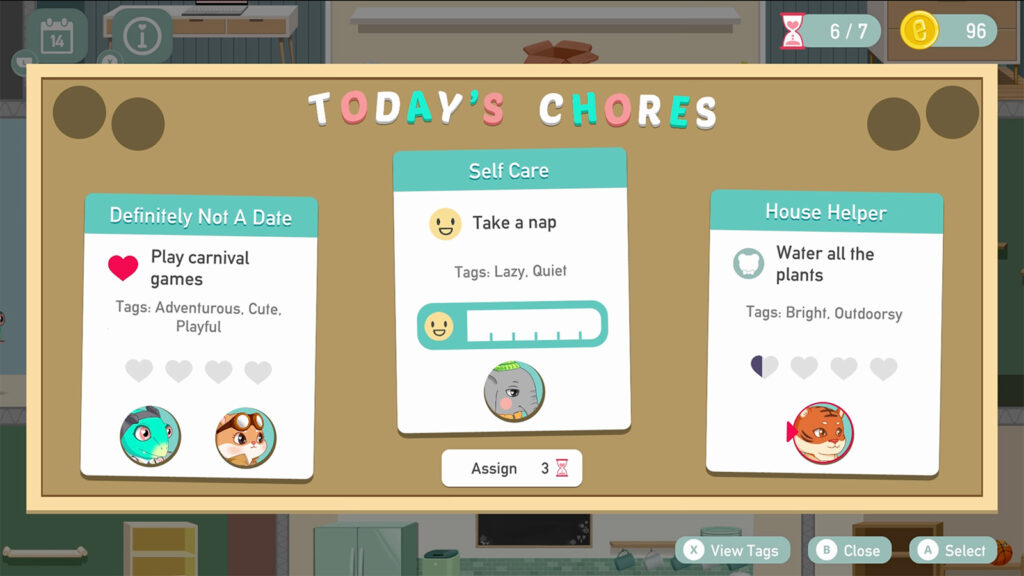
The limit helped slow down my relationship building and pushed me to think about how best to pair characters up, rather than immediately force them all into social events. At the same time, it often led to very short in-game days as I knew who needed to do what. This was particularly apt at the beginning of the game when I had limited actions, leaving me with nothing else to do but end the day and repeat the cycle, incredibly simplistic actions that were fine for me in bursts of playtime but a little tiresome if I ever decided to try and play for longer sessions.
Love, Ghostie opens up slightly when you eventually unlock customisation, allowing you to redecorate every room of the manor. It’s a nice touch but you’re limited to only moving items from one position to another across the house. It was a nice welcome change, but further customisation options would have made this much more enjoyable.
Progression is a ghost’s work
Over time, you’ll see the relationships between housemates blossom through a heart indicator, with the number of filled-in hearts reflecting how well the two characters know one another. By hitting these milestones and getting housemates to interact with each other, you’ll earn RelationChips, which function as a form of experience points through which you can expand the number of housemates in the manor, unlock more daily actions, unlock hilarious spam-based mini-games, unlock hats for Ghostie, and so much more. The upgrades are expensive, though, and I found myself having to think carefully about what to purchase first, particularly as they can only be purchased every three days when Ghostina performs a check-in on you.
As you fill in hearts, you’ll unlock events that move a story between a pair of characters forward. I watched the fancy Ollin and the gloomy Gerard work out their struggles around fashion, the anxious Chamel worry about them shedding scales to the assertive Apollo, and the cutesy Mina work out how to overcome her fears in haunted houses with the mysterious Noir.
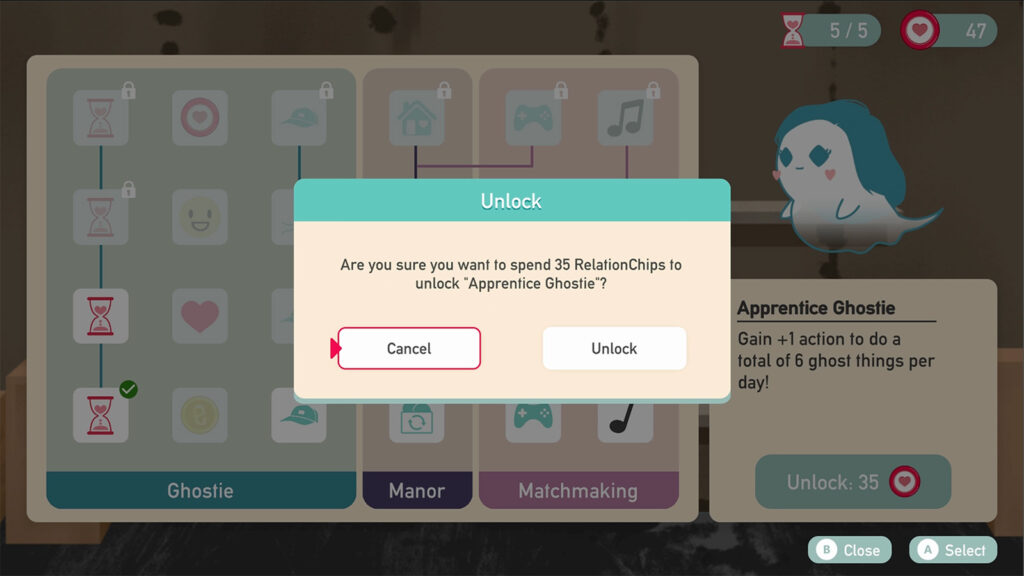
These key events, along with any social events you send a pair of characters on, can be viewed at any time, and they were some of my favourite moments in Love, Ghostie. It was wonderful seeing characters progress and overcome their differences or fears, and it’s the game’s championing of acceptance that really struck a chord with me – all characters, regardless of their interests, likes, dislikes, and worries, were accepted by all others. It was wholesome and refreshing to see, particularly in today’s modern world where negativity and conflict dominate headlines and social media, and it’s something that truly made Love, Ghostie feel like a game you really can just get cozy with and relax.
While I do wish the gameplay loop was a little more expansive, just to offer something else to do once all actions have been used up, I still massively enjoyed my time with Love, Ghostie, and I strongly believe it’ll be a game I return to whenever I’m feeling a little low and need a pick-me-up or a good laugh at our hauntingly witty mentor Ghostina. It may be simple, but Love, Ghostie is the wholesome dating sim I never knew I needed: funny, heartfelt, and always comforting to return to.”
A review copy was provided by Janbeh Games for Nintendo Switch 2.
